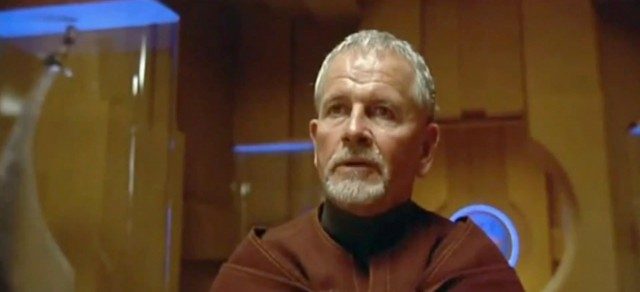The careers of British actors endlessly fascinate me. Take The Fifth Element. Okay, Bruce Willis. But you also have, in that movie, two men who have done simply everything. Shakespeare. Biopics. Dopey action movies. Mysteries. World War II dramas. Tales from the Bible. Chekhov. And that’s just Ian Holm; I’m not even looking at Gary Oldman’s list right now. There is also, I think, considerably more crossing back and forth between movie and TV in a British career. Ian Holm did near equal numbers; per IMDb, 66 movies and 64 TV shows. Heck, he’s played Dr. Frankenstein, Frankenstein’s father, and the monster. Two of those in a single production.
And, of course, he did stage, which is how he ended up with a scar on his finger. He was doing Coriolanus with Baron Larry, who I guess got a little too exuberant. Then in 1976, Holm apparently developed crippling stage fright during a production of The Iceman Cometh and did almost no theatre thereafter. From what I can tell, on the few occasions where he did return, he was universally considered brilliant, but we just had to be satisfied with all the other acting he did on screen instead.
He is also one of those actors where it can take some time narrowing down where you first know him from. Is it Alien, covered in milk—which he hated, making his final scene possibly one of the worst ones for him? Is it as Bilbo Baggins? All that Shakespeare with Branagh? All that weirdness with Gilliam? Or do you just hear his voice, slowly going mad in a Pixar French kitchen? I’m not sure he was ever top-billed; his Bilbo, of course, was the elderly one and therefore not the one who drives any of the stories. But my goodness he was in a lot.
What’s more, he was good, in that quiet, understated way. Seldom flashy. He seemed, to me, to specialize in slightly bewildered elderly men, by the time I became aware of him. And before that slightly bewildered middle-aged men. Yes, all right, you can’t describe all of his characters that way—the man played Himmler, after all—but Ian Holm characters were often out of their depth in the story, even if all that they were experiencing was life. He was skilled at befuddlement.
I wonder what influence his parents had on that; both his parents worked at a mental insitute. His mother was a nurse; his father was a psychiatrist. At the age of seven, they took him to see a production of Les Miserables—which he was also in once—and that was apparently The Moment for young Ian. This is another thing that fascinates me, what moment clinches for people that they want to be actors. Often, it’s live theatre. Even if they grow up unable to act in it anymore.

